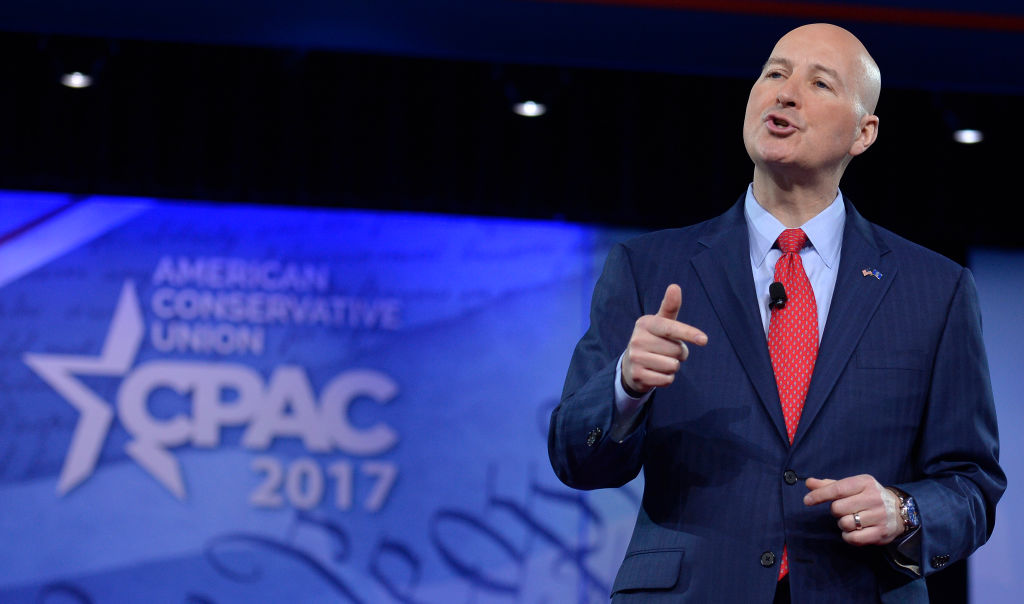Nebraska governor gives predecessor Pete Ricketts a Senate seat he lost by 28 points 17 years earlier


A free daily email with the biggest news stories of the day – and the best features from TheWeek.com
You are now subscribed
Your newsletter sign-up was successful
New Nebraska Gov. Jim Pillen (R) on Thursday appointed his predecessor, former Gov. Pete Ricketts (R), to the Senate seat vacated by former Sen. Ben Sasse (R-Neb.) on Jan. 8 when he resigned to become the new president of the University of Florida. Pillen said he had interviewed nine Republicans for the vacancy, and chose Ricketts because he believes he will win a special election for the seat in the fall and a full term in 2026. "I don't believe in placeholders," Pillen said.
The appointment is unsurprising because "Ricketts is the most established figure in the Nebraska GOP and supported Pillen as his successor to the governor's mansion," Aaron Blake writes at The Washington Post. "But the argument about Ricketts's political strength would have seemed utterly crazy less than two decades ago," when Ricketts lost a challenge to then-Sen. Ben Nelson (D-Neb.), 64 percent to 36 percent.
"Ricketts spent roughly $14 million of his own fortune on the 28-point loss," Blake notes. "As a Republican in Nebraska. And against a first-term senator who had only narrowly won office six years earlier. It's one of the biggest losses on record for a candidate who would later join the Senate." Ricketts, a wealthy son of TD Ameritrade founder Joe Ricketts and part owner of the Chicago Cubs, will be the favorite to win the seat in his own right in November.
The Week
Escape your echo chamber. Get the facts behind the news, plus analysis from multiple perspectives.

Sign up for The Week's Free Newsletters
From our morning news briefing to a weekly Good News Newsletter, get the best of The Week delivered directly to your inbox.
From our morning news briefing to a weekly Good News Newsletter, get the best of The Week delivered directly to your inbox.
"Ricketts was a top backer of Pillen's campaign," and "Sasse did not resign until after Pillen was sworn in, allowing Ricketts to fill the seat without having to self-appoint himself," Politico reports. But "both Pillen and Ricketts brushed off questions about backroom deals when it came to filling the seat." Pillen may have put his thumb on the scale for the upcoming Senate races, but backroom deals are "not my DNA," he said Thursday.
A free daily email with the biggest news stories of the day – and the best features from TheWeek.com
Peter has worked as a news and culture writer and editor at The Week since the site's launch in 2008. He covers politics, world affairs, religion and cultural currents. His journalism career began as a copy editor at a financial newswire and has included editorial positions at The New York Times Magazine, Facts on File, and Oregon State University.
-
 Bad Bunny’s Super Bowl: A win for unity
Bad Bunny’s Super Bowl: A win for unityFeature The global superstar's halftime show was a celebration for everyone to enjoy
-
 Book reviews: ‘Bonfire of the Murdochs’ and ‘The Typewriter and the Guillotine’
Book reviews: ‘Bonfire of the Murdochs’ and ‘The Typewriter and the Guillotine’Feature New insights into the Murdoch family’s turmoil and a renowned journalist’s time in pre-World War II Paris
-
 Witkoff and Kushner tackle Ukraine, Iran in Geneva
Witkoff and Kushner tackle Ukraine, Iran in GenevaSpeed Read Steve Witkoff and Jared Kushner held negotiations aimed at securing a nuclear deal with Iran and an end to Russia’s war in Ukraine
-
 Witkoff and Kushner tackle Ukraine, Iran in Geneva
Witkoff and Kushner tackle Ukraine, Iran in GenevaSpeed Read Steve Witkoff and Jared Kushner held negotiations aimed at securing a nuclear deal with Iran and an end to Russia’s war in Ukraine
-
 Pentagon spokesperson forced out as DHS’s resigns
Pentagon spokesperson forced out as DHS’s resignsSpeed Read Senior military adviser Col. David Butler was fired by Pete Hegseth and Homeland Security spokesperson Tricia McLaughlin is resigning
-
 Judge orders Washington slavery exhibit restored
Judge orders Washington slavery exhibit restoredSpeed Read The Trump administration took down displays about slavery at the President’s House Site in Philadelphia
-
 Hyatt chair joins growing list of Epstein files losers
Hyatt chair joins growing list of Epstein files losersSpeed Read Thomas Pritzker stepped down as executive chair of the Hyatt Hotels Corporation over his ties with Jeffrey Epstein and Ghislaine Maxwell
-
 Judge blocks Hegseth from punishing Kelly over video
Judge blocks Hegseth from punishing Kelly over videoSpeed Read Defense Secretary Pete Hegseth pushed for the senator to be demoted over a video in which he reminds military officials they should refuse illegal orders
-
 Trump’s EPA kills legal basis for federal climate policy
Trump’s EPA kills legal basis for federal climate policySpeed Read The government’s authority to regulate several planet-warming pollutants has been repealed
-
 House votes to end Trump’s Canada tariffs
House votes to end Trump’s Canada tariffsSpeed Read Six Republicans joined with Democrats to repeal the president’s tariffs
-
 Bondi, Democrats clash over Epstein in hearing
Bondi, Democrats clash over Epstein in hearingSpeed Read Attorney General Pam Bondi ignored survivors of convicted sex offender Jeffrey Epstein and demanded that Democrats apologize to Trump
